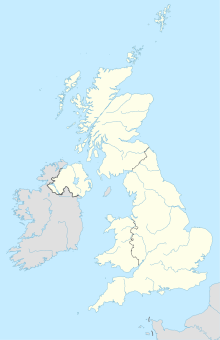Tipton (West Midlands)
Coordinates: 52 ° 32 ′ N , 2 ° 5 ′ W
Tipton is a city in the district of Sandwell in the West Midlands ( England ) with a population of about 47,000.
geography
Tipton is halfway between the two cities of Birmingham and Wolverhampton . It is part of the greater West Midlands and the so-called Black Country .
history
Once one of the most industrialized towns in the Black Country, Tipton was once considered the hub of this region, so named because chimneys polluted the air here while houses and factories were built side by side. Until the 18th century, Tipton was only an amalgamation of small towns. Industrial growth began around 1770 when iron ore and coal were found. A lot of canals, later also railroad tracks, were built or laid, which increased the speed of industrialization . The engineer James Watt built his first steam engine in or near Tipton around 1770 , which was used to drain the mines. In 1780, James Keir and Alexander Blair established the chemical industry, which produced large quantities of alkalis and soaps . The great expansion of the iron and coal industry caused the population to rise rapidly from 4,000 (around 1800) to 30,000 (around 1900) within just a century. Tipton was a borough of Staffordshire County until 1938 when it received town rights. Most of the borough was moved to the borough of West Bromwich in 1966 . Along with West Bromwich and other places, Tipton became part of a newly created administrative district called Sandwell in 1974.
Most of the factories closed during the 1980s and many residential areas were built on their sites. This was a godsend for Tipton as property prices rose sharply during this time. Most of these traditional industries that once dominated the cityscape have now disappeared as part of an industrial structural change .
Population and politics
About 40 percent of the population have an annual income of less than £ 20,000 (approx. € 30,000) per year. About half of all households in Tiptons do not own a car. Politically, the Labor Party, which emerged from the labor movement , dominates the city, but right-wing parties have also recently achieved success. From 2006 to 2010 the British National Party was represented with up to four MPs on the City Council ( Sandwell Metropolitan Borough Council ).
More recently, Tipton has also become known for the so-called “Tipton Three”. Ruhal Ahmed , Asif Iqbal and Shafiq Rasul , three young British people from Tipton, were arrested by Northern Alliance militias in Afghanistan in 2001 and were detained in Guantánamo Bay for almost three years , without charge or legal representation. In 2004, the Tipton Three were released without charge. The fourth youth, Mounir, who disappeared from the American bombing while fleeing Kunduz , was never found again. Her story attracted particular international attention when she was filmed in 2006 by Michael Winterbottom as The Road to Guantanamo .
Culture and sights
The Black Country Living Museum near Dudley has faithfully recreated life around 1900. There is also a canal basin there. Tipton was once also known as the " Venice of the West Midlands" because of its many canals. Today many of these canals have been filled in again (around 1970).
A very distinctive dialect is spoken in the region , despite its proximity different from Birmingham. The dialect is very similar to the one that William Shakespeare spoke, partly because he lived not far from here.
The city has a traditional horse-keeping culture. Private horses are kept free on public land and can also sometimes be seen on the streets.
Neighboring municipalities to Tipton are: Tipton Green, Princes End, Tibbington, Toll End, Ocher Hill, Dudley Port, Gread Bridge, Tividale.
Personalities
- Philip Bradbourn (1951-2014), British politician
- James McQuilkin (* 1989), football player
